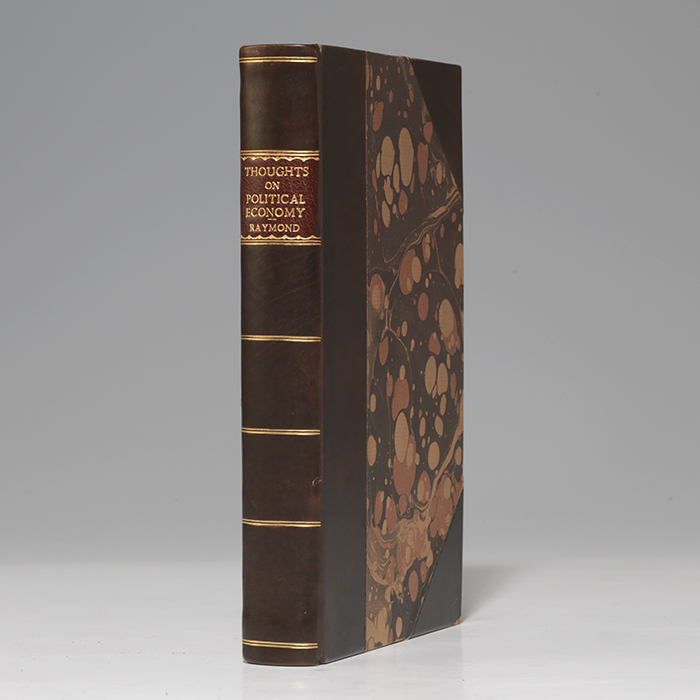
"THE FIRST SYSTEMATIC TREATISE ON ECONOMICS FROM THE PEN OF AN AMERICAN": VERY SCARCE FIRST EDITION OF RAYMOND'S INFLUENTIAL THOUGHTS ON POLITICAL ECONOMY, 1820
RAYMOND, Daniel. Thoughts on Political Economy. Baltimore: Fielding Lucas, 1820. Octavo, modern three-quarter brown calf, red morocco spine label, marbled boards, uncut. $9500.
First edition of Raymond's pioneering work on political economy, boldly challenging Smith's Wealth of Nations in opposing laissez faire, free trade and principles of individualism, praised by John Adams as "a proud monument of American literature," arguing government "should be like a good shepherd, who supports and nourishes the weak and feeble ones in his flock," one of only750 copies, a very scarce uncut copy.
Daniel Raymond, "America's first systematic economic thinker, rejected the extreme individualism of the classical political economy as it had developed by the 1820s" (Frey, Good Samaritan). Thoughts on Political Economy, his first book, challenges Adam Smith's Wealth of Nations (1776)—opposing laissez faire. free trade, and "the philosophy of individualism, which was the accepted gospel" of the age (Neill, Daniel Raymond, 23). Praised by John Adams in a February 1821 letter, calling Political Economy "a proud monument of American literature," publication was nevertheless so contentious that barely 750 copies were issued in this rarely found first edition. "The importance of Raymond's work is not alone in that it is the first systematic treatise on economics from the pen of an American, but also in that it shows the influence of American conditions, and in consequence presents a theory of political economy opposed at all points to the prevailing system as developed by the dominant school of Adam Smith (Neill, 8). To economic historian Henry Spiegel, Raymond is "an original thinker, whose ideas reverberated in the later writings of Friedrich List, the historical economists and the 20th-century literature on economic development" (New Palgrave).
When an American protectionist movement emerged after the Panic of 1819, it was Raymond, trained as a lawyer, who "gave protectionist doctrine genuine intellectual heft" (Willentz, 298). "The historical uniqueness of American democracy made for economic and social conditions that were equally distinct. Protectionists celebrated these distinctions as essential qualities of American exceptionalism… Like Hamilton, Raymond's political economy transmitted the concerns of a newly independent nation still debating the role of the sovereign. Personal economic freedoms were not sacred, particularly if they undermined national interests. Government had the right and obligation to place the national economy ahead of its citizens" (Calvo, American Political Economy, 111-14). "Baldly stating that the interests of a nation and of individuals 'are often directly opposite,' Raymond rejected individualism entirely to suggest that the government should be the main agent of the common good, that it 'should be like a good shepherd, who supports and nourishes the weak and feeble ones in his flock.' Raymond also anticipated the branch of economics now called macroeconomics, which provides the major alternative within economics to the largely neoclassical microeconomics of self-interest. Raymond suggested that even the most rational decisions of individuals could not prevent the economy from developing systemic ills" (Frey). To Raymond the "wealth of one class of citizens does not of necessity imply an equal increase in national wealth… This concept of national wealth is the first characteristic of Raymond's system… The second is his insistence upon the recognition of the idea of a nation as an organic unit… From these two principles, Raymond argues that it is not the province of political economy to study how values are created and augmented, and how individuals or classes may acquire wealth; but rather to study how government may best legislate to secure the greatest well-being to all its citizens alike" (Neill, 30). Raymond, who was also an early abolitionist, publishing an 1819 pamphlet opposing the admission of Missouri as a slave state, may well have influenced Stowe Uncle Tom's Cabin (1852). "Raymond lived in Cincinnati between 1842 and his death in 1849, years in which Stowe lived in the city and associated with its intellectuals. Raymond also attended the Litchfield law school of Stowe's beloved hometown… Just as Raymond resisted the laissez faire policies of Jacksonian America, the injustice of selfish economic motivations is everywhere in Uncle Tom's Cabin" (Lee, Slavery, Philosophy and American Literature, 61). In 1840 John Quincy Adams made "a formal presentation of a copy of Raymond's book to the library of the House of Representatives" (Neill, 27). Raymond's Political Economy remains "the first systematic work on this subject by an American" (Howes R82). Followed by a second edition in 1823 titled, The Elements of Political Economy: the total number of both editions was 1250 copies. Sabin 68042. Goldsmiths 22774. Kress C605.
Interior generally fresh with lightest scattered foxing, minor expert archival repair to title page and several leaves (163, 209-220), A highly desirable near-fine uncut copy of a foundational work in American economics.